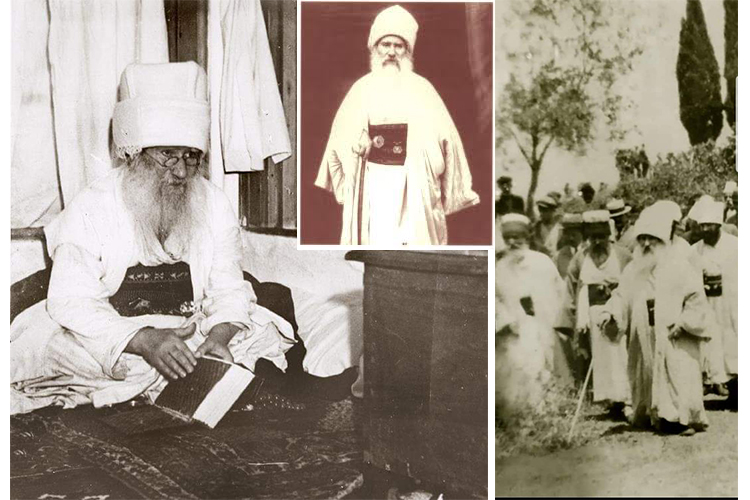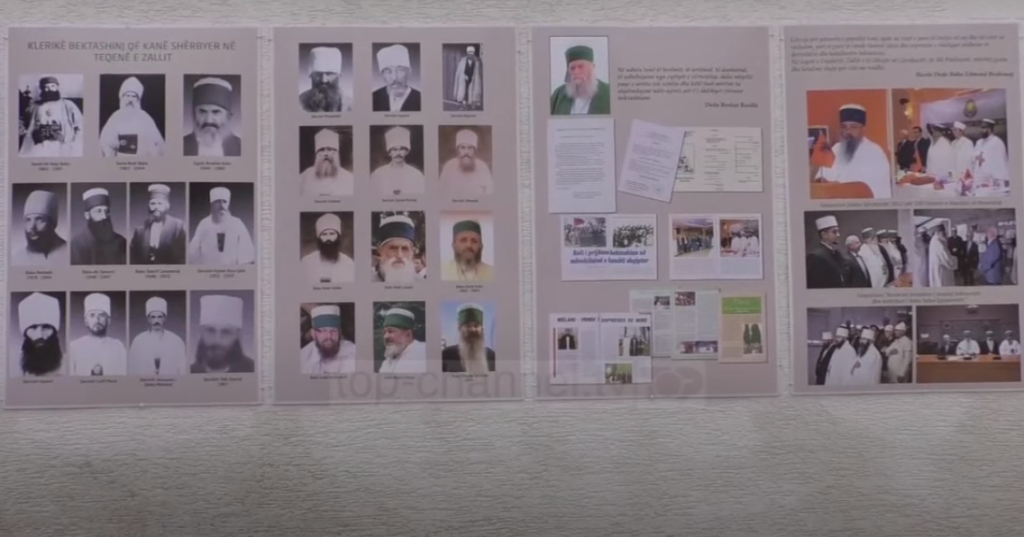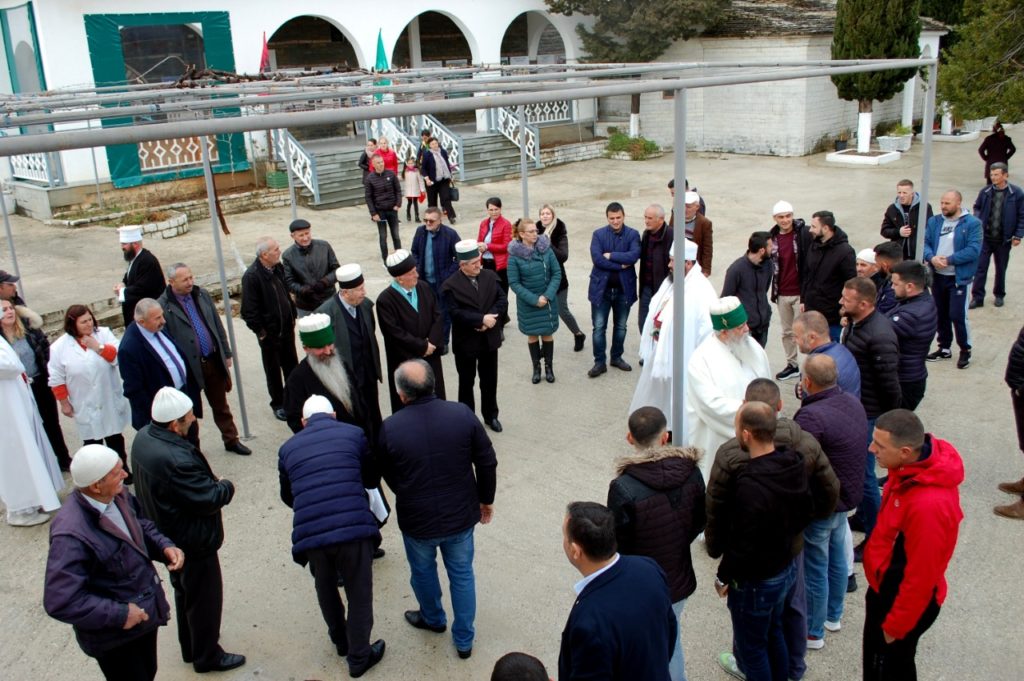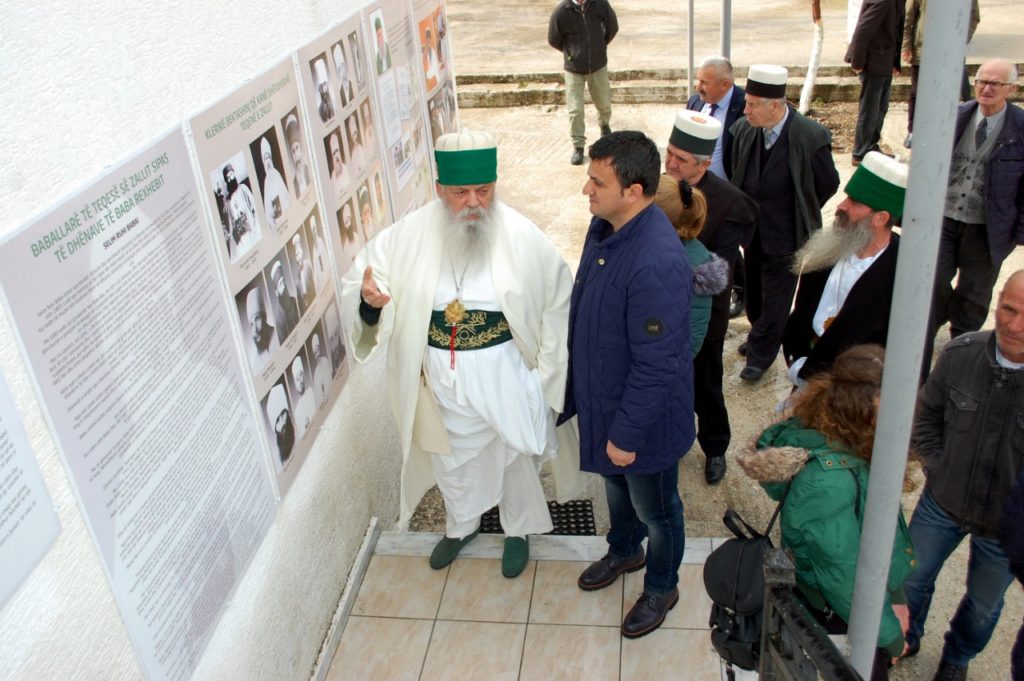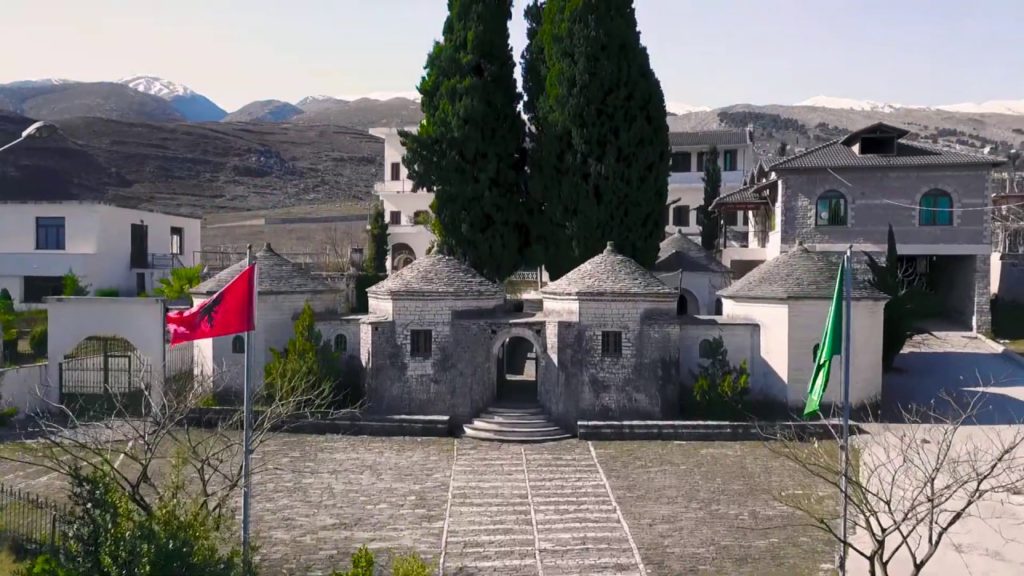
Today is the 241st anniversary of the founding of the Zalli Tekke in Gjirokastra, a well-known Bektashi institution, in which well-known clerics have served and at the same time, has served as a school for the preparation of dervishes and numerous fathers.
Among the first missionaries sent to Albania were Father Ali Horasani, Kruja; Dylgjer Hysejni, father Ali in Elbasan, Berat, Skrapar, Kolonja, Përmet, Vlora etc. This fact is also pointed out by Evlia Çelebi, for the first tekkes in Vlora, Gjirokastra, Pogradec, Father Arshiu in Gjirokastra and many others. All of them came to Albania between the 14th and 15th centuries. These missionaries worked tirelessly to lay the foundations of Bektashism in Albania, as well as in other countries. Gjirokastra recognized the first missionary, Father Arshiu, in the 16th century.
Baba Arshiu was originally from Anatolia. He passed away in 1621. His tomb is located in the Cfakë country. Subsequently, the tekkes of Asim’s father, Shtuf and Mes were set up one after another. Gjirokastra has had three famous tekkes with a long history.
The story of the beginning of the Zall tekke is related to its founder, Muhamet Asim Babai, who is one of the prominent Bektashi guides and writer of the time. He was of the prophetic race, hence the title Sayyid. He was born in Skutari, Istanbul and is from the trunk of Father Hashim. There he was called Bandërmalli Zade. Asim Babai taught at Haxhi Bektashi School in Turkey and acquired a broad culture. He knew mysticism very well. He received the rank of grandfather, from the tekke of Haxhi Bektashi and was sent to Albania in 1778, to Gjirokastra, to spread Bektashism in this city. At first there were many opponents of Bektashism, but with his holy spirit and culture he convinced all opponents after two years. At the time he founded the Zall tekke in 1780, he was staying in a tent. He descended from the tribe of the prophetic family son after son, from Asim Father to Imam Musa Qazimi. Muhamet Asim father, was also a writer. He has written a book in prose entitled “Yildizname”. He also wrote a small sofa in manuscript, where are his poems with mystical spirit. His tekke, developed a lot. After him, in this tekke, came at its head fathers with culture. This tekke, in its history, turned into an important cultural center. There was a rich library of classical religious books, written in traditional religious languages, Arabic, Persian, Turkish and, finally, it was equipped with books of this kind in Albanian, and in some European languages, such as Italian and French. In this tekke, one after the other enlightened fathers came until 1944 as: Father Hasani of Turkish origin, Baba Sulejmani from Gjirokastra, dervishes of Hasan Father who is from the tribe of Brisk, in Gjirokastra. Father Sulejmani had no heirs from his tribe and, 60 dynym fields he had in the village of Terihat of Dropull, inherited from his father, he forgave the tekke, which he owned for a long time. These properties, then he sold them and with their money, bought 80 dynym fields in the field of Kordhoca, near the village Lazarat, in his name, which were owned by the tekke until the end. Father Sulejmani passed away in 1806. After him, ‘Father’ was decreed, from the tekke of Haxhi Bektashi, his dervish, Father Ali Gega, who was known in that tekke as Father Ali Plaku. Father Ali Plaku is the brother of Islam Gega, from the Gega tribe in Gjirokastra. He was from a wealthy family at the time and, when his father settled in the tekke, he shared part of the property, inherited from his father, with his brother Islam and, for his part, donate the tekke. His wealth consisted of mera ‘, çaire and ara, in the place Soreza (Kallo) of Gjirokastra, near the village Këllez. These fortunes were owned by the tekke to the end. Father Ali Plaku, had left a memory in the tekke of the musluk (water depot), which he had built himself. He rendered many services to Bektashism for 24 years. He passed away in 1830. Hajji Jahja Babai did not stay long in this tekke, only 6 years. When he went to visit his people in Kruja, the people there greatly sympathized with him and, in his honor, built from the foundation a new tekke, with his name, inside the city of Kruja and kept him there. He replaced his post in Gjirokastra with his dervish, Father Ibrahimi, who stayed for 9 years. After him came Father Ali Haqi, who is one of the great Bektashi writers and poets. He is one of the most prominent and enlightened clergymen of his time, both in terms of culture and in terms of the great prestige he enjoyed. His biography is very interesting. Father Aliu, then opened Bektashism a lot not only in Gjirokastra (which in the vast majority of inhabitants became Bektashi), but also expanded it to districts such as Delvina with its villages, Libohova, Nepravishta, Tepelena, Kurvelesh, Përmet and up to Korça and Elbasan. In Vlora, there was Father Qamil, his brother, Alina, and many myhibs from Smokthina of Vlora, such as Shero Agai and others… The number of its spiritual members exceeded 2000 people. He had dressed with his own hand, forty dervishes, and had decreed himself twelve fathers, who are:
-Father Hyseni of Manastir (Monastery),
-Father Hyseni i Jumasa (Xhumai Baba),
– Father Hajdëri of Gjirokastra (Gjirokastra),
– Father Aliu i Elbasanit (Elbasan),
– Father Abdullai of Catherine (Thessaloniki),
– Father Ali Turani (Turan-Tepelena),
– Father Ismail Gllava (Berat)
– Father Belul i Therepelit (Skrapar),
-Father Mustafa Memaliani (Tepelena),
– Father Selman of Rabija (Tepelena),
– Father Sejfulla Melani (Illegal),
– Father Selim Elbasani (Gjirokastra).
Father Selim Ruhi is one of the Bektashi clerics, scholars and poets of the late 19th century. He was born in the city of Elbasan in 1869. Here, in his hometown, he did his primary studies, then entered the religious college (madrasa), which he successfully graduated at the age of 16 years. In 1885, he came to Gjirokastra to father Ali, with his father, Xhemali, and took his hand. There he continued for another two years the special course of the college in Gjirokastra, where he was well acquainted with culture, studing three classical religious languages, Arabic, Turkish and Persian. He received the cultural decree (ijazetnamene) and, no longer separated from him, until 1888. Three years later, in 1891, he was handed over to the dervish by the hand of father Ali. He always continued his studies, bringing year by year new books from Istanbul, which he sang and studied with his father Ali. There was no book left, no comment left that he had not seen. Not only with religious subjects, but also with other subjects, such as history, geography, literature, scientific books, natural history books, philosophy and other subjects of this kind. He was trained in every field, as he could be considered the most cultured of all the clergy of his time and the most intellectually uplifted. Scholars distant from Libohova, Delvina, Korça and other places, came to the tekke and slept there for days. Many times, they filled the week and did not leave his sweet conversation.
So, when Father Ali passed away, in 1907, according to his decree and order,Father Selimi, took his post and performed the duty with extraordinary dignity and ability for thirty-seven years in a row, just like Father Ali himself .
The clergy who led the Zalli tekke (in order):
– Father Asim, 16 years old
– Father Hasan Turku, 2 years
– Father Sulejman Gjirokastra, 8 years
-Father Ali Gega, 6 years
– Father Haxhi Jahja Kruja, 6 years
– Father Ibrahim Turku, 9 years
– Father Hysen Elbasani, 16 years old
-Haxhi Ali Haqi, 46 years old
– Father Selim Ruhi ,37 years old
After 1944:
-Grandfather Ibrahim Kuka
-Dervish Esat Rakip Lazarati
-Dervish Shahin Rushit Hasim
– Dervish Riza Fejzo Buzi
– Dervish Sherif Shaban Çanaj
– Dervish Hysen Rizas Gjini
– Dervish Muhamet Kënellaj
-Father Abedin Agaj
– Dervish Shazuivar Mickaj
– Dervish Teki Dautaj
-Father Haxhi….
-Father Sadik Ibro
– Father Abdyl Shehaj
– Father Skënder Dervishi (currently)
Prepared by:
Nuri Çuni
